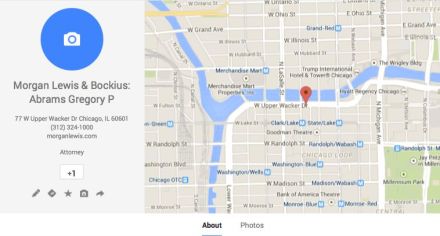What has truly made Google the search engine of choice is the relevancy of the results it delivers in response to your well-phrased – or often poorly phrased — search parameters. This year after year performance is what makes me believe that Google’s most recent local business initiative, Google My Business, is flawed. Let me connect the dots.

A search for this law firm by its “common” name generates a call out to a specific attorney and a Google+ page link to the un-managed and unclaimed faux profile of this one attorney. I’m sure he has no idea.
I have a national law firm client that is very concerned about the search results delivered by Google. If one searches on Google for this firm by its name what appears in the search engine results page is a call out to one specific attorney, not the firm. If you click on the Google+ link associated with the firm, you are directed to an un-managed Google Plus page for this one attorney. Now that is surely not the results you are looking for.
Your Results May Vary
To be candid, this discussion may be specious. To achieve its objective of delivering relevant results to your query, search engine results vary among users. So it is really not clear that you will get the result I experience. And to really get into the weeds, search results change based on the precise phrasing of the query, such as full business name or searched with quotes around the name. But specious or not, it is a fact that Google frequently delivers inaccurate and irrelevant information for a common and simple query of a business name.
Blame it on Google My Business

This is an example of a faux profile, created automatically by Google and un-managed and unclaimed by the likely “owner”. The best thing to do is to delete this profile. Yes, you can.
It would appear the problem originates in Google’s reliance on Google My Business to provide supportive information to help it deliver, not only accurate, but rich information such as ratings and reviews, third party descriptions, headquarters, founding date and a lot of other, in my opinion, mostly useless data. Good in theory but questionable in execution. There’s no doubt that Google will diddle endlessly to improve search engine results page content & layout. But I digress.
The flaw is that, for whatever reason, Google has automatically created a Google Plus profile for this professional working within the firm and defined it as a local business. There are a boatload of these un-managed, unclaimed and unreal profiles in the Google My Business catalog. I call them faux profiles. When a search is performed for the business, this un-managed faux profile is included in the featured results. And this is wrong. This is bad content. But is that Google’s problem? Or is it yours? Doesn’t matter. Fix it.
SEO Blocking & Tackling
It would appear there are two steps that can be taken to correct this situation. The first is for the business to claim its Google Plus profile. This is SEO 101. And probably better yet, actually populate the profile, publish content and push the profile into the Google Plus social ecosystem. What? Another social media platform to manage? Yes, if you are feeling like your engagement in Google Plus is being coerced in return for accurate listings in the search engine results, you would not be alone. Just play the game and shut up.
The second thing to do is to delete the faux individual profiles that were created automatically by Google. Yes! You can. Claiming & deleting these profiles is a little more involved and if anyone gives a damn about this issue but can’t figure it out I’ll detail it in another post. Just ask.
Disclaimer
The problems I’ve described are real. The solutions I propose may not be. It’s an ongoing project and I’m sharing my solution and welcome the experience of others. The examples I’ve displayed here were publicly viewable to me and do not represent current or prior clients.